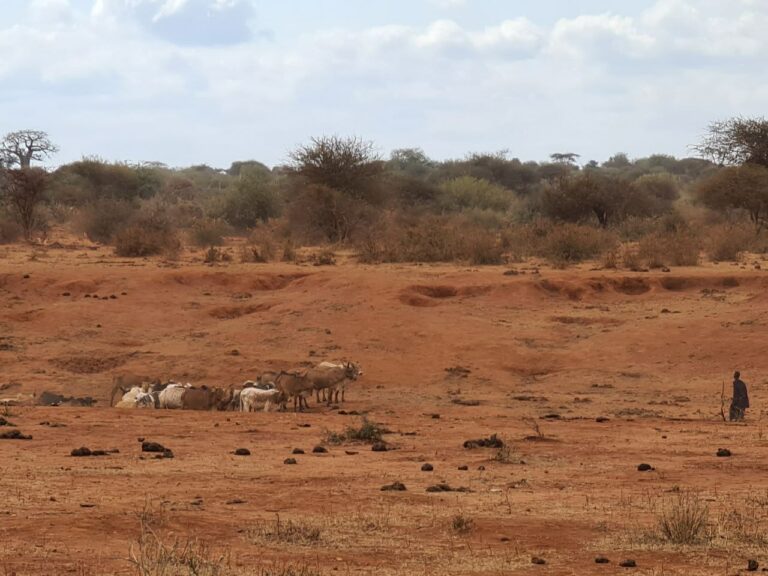
Going through the motions: Verra’s review of sexual abuse at Kasigau
On 6 November 2023, the Kenya Human Rights Commission (KHRC) and the Centre for Research on Multinational Corporations (SOMO) published a report(opens in new window) documenting serious allegations of sexual harassment and abuse at the Kasigau carbon offset project in Kenya, which is run by the US-based company, Wildlife Works Carbon (‘Wildlife Works’).
In response, the standard-setting body, Verra, suspended the project and announced(opens in new window) it would pursue an investigation into the issues. Verra, which describes itself as managing “the world’s leading voluntary carbon markets program”, is the main standard-setting body for carbon offset credits in the voluntary carbon market, particularly for forest-based projects. Verra’s certification of projects such as Kasigau is the basis on which customers – usually major multinational companies – buy carbon credits. On 1 February 2024, Verra published(opens in new window) the outcome of its review of the Kasigau project.
Verra concluded that Wildlife Works “has demonstrated that it is taking the actions required to address the alleged harm and to mitigate the risk of future harm.” As a result, Verra lifted the project’s suspension and restored Wildlife Works’ ability to generate carbon credits from Kasigau.
Below, we assess Verra’s review in more detail. KHRC and SOMO shared our concerns about the review with Verra and received a response from the organisation on 22 March.
A flawed review with harmful omissions
Verra’s review covers four issues (which it terms ‘findings’): namely, sexual offences; inadequate mechanisms for reporting sexual offenses; other negative community impacts; and improper employment practices. In each section, Verra sets out the allegations, the requirements of the various carbon offset standards that are applied to the Kasigau project, and the response of the project developer – Wildlife Works.
Finding 1: Sexual Offences
In its review of Kasigau, Verra claims that it “took into account the full SOMO/KHRC Report”. However, the Verra Review Findings Report(opens in new window) fails to address many of the abuses identified in our research. Moreover, it appears to be based substantially on an internal investigation carried out by a law firm commissioned by Wildlife Works and on information provided by Wildlife Works to Verra, even though it was the company’s failures that were being investigated.
Following the law firm’s investigation, Wildlife Works announced that it had terminated two staff members: one for gross misconduct involving a breach of company policy on sexual harassment and another—the Human Resources (HR) Manager—for creating a “culture of fear” that prevented reporting of sexual misconduct.
While these actions are important, KHRC and SOMO have expressed concern about the limitations of the Wildlife Works’ investigation process. One key concern is that the company has claimed that our report “attempts to indicate the widespread nature of this problem, yet in their letter to us [Wildlife Works] they identified one perpetrator as responsible for the specific sexual harassment allegations, and one department as the place where all these allegations occurred; and A&K’s [the law firm hired by Wildlife Works] investigation also found that was the case.”
This statement by Wildlife Works is false, and in a public response on 9 November 2023, KHRC and SOMO formally challenged it, making it clear that we had identified several alleged perpetrators of sexual abuse. The letter that Wildlife Works refers to in the above quote was sent to them on 4 August 2023, before the report was published. The following are direct quotes from that letter with the redaction of one individual’s name and title:
“Our investigations at Kasigau have revealed serious allegations of sexual exploitation, harassment, sexual assault, and attempted rape of women by senior employees of Wildlife Works (WLWs) and by rangers employed by Wildlife Works. Women interviewed named some of the individuals who extorted sex based on the power of their position and/or the inability of women to prevent the abuse.”
“Over the course of our investigation [name redacted] was named repeatedly. For the avoidance of any confusion, this individual was also sometimes referred to as the [title redacted], but always as [name redacted]. Other individuals, including office staff and rangers, were named also as being involved in sexual harassment and/or assault of women. These names are not shared here due to the need to protect those who gave testimony.”
This letter – and the report itself – could not be plainer about the scope of the allegations we documented. KHRC and SOMO drew Verra’s attention to the incorrect claims made by Wildlife Works about the number of alleged perpetrators of sexual harassment and abuse. However, Verra did not respond on this point. Instead, in a letter dated 22 March 2024, Verra stated that the investigation commissioned by Wildlife Works “was not able to corroborate further instances of harassment or abuse”. This response is disingenuous. If the Wildlife Works investigation was based on the false premise that the sexual abuse was limited to one person and one department, as it appears to have been, this would clearly affect its findings.
Moreover, if Verra “took into account the full SOMO/KHRC Report” as it claims, then it should be aware that one section of that report covers the Wildlife Works internal investigation, and raises several critical issues. These include that the lawyers’ choice of people for an interview was based on unknown criteria, that many of the people who provided testimony to our researchers were not selected for an interview, and that the investigation process was conducted in a location that was used by one of the alleged perpetrators to coerce women into sex, suggesting a lack of awareness of basic good practice in interviewing victims of sexual abuse. There was, based on our research, no apparent way for people to come forward and volunteer testimony. Yet, this is precisely what should have been done, offering people the chance to speak to the lawyers in places of their choice, where their privacy and dignity would be guaranteed.
Verra’s Review report fails to engage with any of these issues. As a result, many allegations of abuse, documented by KHRC and SOMO, are swept away on the basis of an investigation whose weaknesses Verra appears to disregard. For example, multiple testimonies referred to the sexual misconduct of one individual, including two women who reported that this man had assaulted them and rangers who told us that they witnessed him assaulting a woman from the community. This man, we understand, is still employed by Wildlife Works.
Finding 2: Inadequate mechanisms for reporting sexual offences
Verra notes that the KHRC/SOMO report “alleged that the project proponent impeded attempts, and imposed barriers, to report the offenses referred to above.” As noted earlier, during its internal investigation, Wildlife Works found that its HR manager at Kasigau had “created a culture of fear and intimidation that, according to interviewed personnel, prevented reporting of sexual harassment incidents.” Wildlife Works provided additional details to Verra, stating that “it was determined that the former HR Manager subverted our grievance mechanism by stopping committee meetings, removing some suggestion boxes and creating an atmosphere in which reporting was discouraged”.
Verra appears to accept this information without any further inquiry. It does not ask why no other manager or senior person was aware of the HR manager’s actions. Nor why no staff members were able to raise his conduct with anyone else at the company.
Instead, in its review report, Verra reproduces, without comment, Wildlife Works’ statement that “[t]he verification process shows that the grievance mechanism is functional.” The ‘verification process’, to which Wildlife Works refers, is the auditing process. This is the same process which repeatedly, over the years, failed to identify the sexual harassment and abuse and failed to identify how the grievance process was being subverted by the HR manager.
Wildlife Works has acknowledged that its grievance process was, indeed, flawed, stating on 5 November 2023 that:
“It is painfully clear to us now that we had gaps in our grievance process specific to sexual harassment issues, which must be treated differently and we are committed to fixing this issue.”
This somewhat baffling juxtaposition of Wildlife Works’ (earlier) admissions — that its HR manager “subverted our grievance mechanism” and “created a culture of fear” —with Verra’s willingness to accept Wildlife Works’ claim that the grievance mechanism at Kasigau “is functional”, underscores the serious deficiencies in Verra’s review. Based on Verra’s review, the removal of the HR manager is deemed sufficient, without any deeper interrogation of how serious abuses were allowed to persist for years.
We asked Verra how it could accept the company’s statement that its grievance mechanism is ‘functional’ when, as clearly documented in the KHRC/SOMO report and self-evident in this case, this mechanism prevented reporting of abuse. Verra did not provide any explanation.
For the women who were unable to report abuse through this ‘grievance’ process, Verra’s inadequate investigation adds insult to serious injury. Moreover, it suggests a level of complacency on Verra’s part towards abuse and failures that should raise red flags for customers of its products.
Finding 3: Other negative community impacts
Under this heading, Verra states that the KHRC/SOMO report “alleged that activities linked to the Projects had negative community impacts other than those referred to in the other findings in this report, including inadequate gender sensitivity in stakeholder engagement and the limitation of fuelwood collection without providing alternatives.” (emphasis added)
The conduct Verra appears to refer to was documented in the KHRC/SOMO report as follows:
- “Women we interviewed described several recent incidents when, as they searched for and collected firewood, Wildlife Works rangers spotted them and told them to stop… On each of these occasions, the rangers subjected the women to hours of humiliation and abuse, forcing them to kneel on the ground for three hours or longer.”
- “Several women recalled how rangers had hurled explicitly sexualised insults and threats at them. In one instance, a ranger had ordered a woman to “take off your clothes… and f*** me.”
- “According to the woman, one of the rangers “held her hand” as he forced her to kneel down. Then, “when I looked up, he had exposed [his erect penis]” and “was ready to assault me”. The only reason he did not do so, she believed, was that one of his colleagues recognised her and told the assailant to stop, apparently fearing that their connection could lead to trouble.”
- “These rangers [male and female rangers interviewed] had either witnessed how certain rangers abused women or heard stories about such aggression. One of them noted that “people in the community fear the rangers”, but they “don’t feel safe to go to the head office to report violent behaviour”.
- “A female ranger recalled an incident where a male colleague, who seemed to mistakenly believe he was alone with his victim, attempted to assault a community woman he found grazing her livestock near the village of Mwagwede. The ranger recalled intervening to prevent the assault and escorting the woman home and speaking to her family.”
- “In another incident, a female ranger recalled that a woman from a nearby village came to the office to report how the same ranger referred to in the incident above had assaulted her. However, as far as she knows, the senior male staff member to whom she reported the attack – a ranger who is widely identified in our interviews as a key perpetrator – did not act on her report.”
The above testimonies cannot be reduced to “inadequate gender sensitivity”. The testimonies also contradict Wildlife Works’ claim that KHRC/SOMO identified only one perpetrator (see Finding 1 of Verra’s review described above).
In its response to Verra on this issue, Wildlife Works focused on community members gathering firewood but did not address the reported ill-treatment and abuse. The claim made by Wildlife Works to Verra that “the independent investigation [assumed to mean the investigation carried out by the law firm hired by Wildlife Works, referred to above] found that the Project’s community rangers are well aware that any mistreatment of community members is grounds for immediate dismissal” appears disingenuous. This statement suggests that Wildlife Works has not investigated allegations of ill-treatment by rangers but only examined whether rangers knew that ill-treatment, if identified, would lead to dismissal. How does the awareness of rangers about what constitutes a firing offence (if it is found to have happened) have any bearing on the reality women experience or on accountability for abuse? Verra should have, at the very least, questioned such a statement by Wildlife Works. There is, however, no evidence that they did.
Furthermore, Verra’s review makes no reference to concerns documented in the KHRC/SOMO report that the conduct of some Wildlife Works staff has increased the risk of HIV infection in the community. Given the potentially severe health impacts of these allegations, they should have been part of Verra’s review.
When the victims of abuse are not at the centre
In addition to the many serious concerns and omissions raised above, Verra’s review also fails to address Wildlife Works’ responsibility to provide meaningful remedy to all individuals affected by abuse. This company bears responsibility for harms done to people coerced into sexual relations with men working for the company. The follow-up actions reported by Wildlife Works to Verra and accepted by Verra do not include support for anyone whose health may have been harmed, nor other elements of the right to effective remedy, such as compensation for victims.
There is no suggestion in Verra’s review that the victims of abuse are relevant, let alone central, to any meaningful investigation into allegations of sexual harassment and abuse. The information presented in Verra’s report is based primarily on accounts by the same company that allowed these abuses to persist for years. Nor is there any suggestion that Verra has taken care to ensure that what it is told by Wildlife Works is accurate.
Verra’s reliance on auditing: the illusion of oversight
Verra’s certification of the Kasigau project is based on audits. Auditors assess carbon offset projects against Verra’s standards and provide reports to Verra. In its review of Kasigau, Verra does not reflect on how the auditors who visited Kasigau over the years failed to identify the allegations of abuse, or at least failed to report them. The review also fails to engage with testimony by an auditor, quoted in the KHRC/SOMO report, whose experiences at Kasigau made them suspect Wildlife Works had coached employees on what they were allowed to tell auditors. Verra has failed to use its leverage to bring real accountability to Kasigau to ensure women are protected from abuse.
On the contrary, Verra states that it will rely on audits to verify Wildlife Works’ compliance with Verra’s standards going forward. Thus, the tools that manifestly failed to identify serious abuses are to be relied upon, once again.
Conflicts of interest at the heart of the carbon certification system
There are fundamental conflicts of interest at the heart of the carbon offsetting system. This may go a long way to explain why abuses at Kasigau went undetected for so long. This might also explain why Verra’s review failed to engage victims while accepting the input of the company whose project it purports to oversee for the purpose of certification.
The auditing and certification system relies on actors with clear financial interests in a system that is being promoted as being good for the climate and communities. Auditors are usually companies. They are hired by project developers and are, therefore, auditing entities that are their clients. Based on KHRC and SOMO’s review of audits done on Kasigau, Verra appears to apply minimal scrutiny to audit reports before certifying projects. Once certified, a project can generate and sell carbon credits. The system works for these actors. But at Kasigau, the system manifestly failed women employed by Wildlife Works and, based on the research of KHRC and SOMO, also individuals in the wider community.
Standard-setting organisations such as Verra are not insulated from commercial pressures. They can only survive if their self-regulated standards and verification processes are accepted by those who sell and by those who buy the carbon credits. None of these actors want news of abuses that would tarnish their reputations and businesses.
Communities, on the other hand, face being told that reports of abuse can lead to loss of benefits if the project is suspended, which can be read as a choice to accept abuse or lose benefits. No community should have to make this choice.
The illusion of accountability
Verra’s investigation into the serious abuses at Kasigau lacks credibility. It presents a facsimile of a review but interrogates almost nothing.
In any understanding of due diligence and adequate response to allegations of serious abuse, relying substantially on the company’s input is inadequate. Yet, this is the core of Verra’s ‘findings’ and review outcomes. While Verra claims to have read other materials that provide further evidence on the case, there is little indication of this in its review.
Verra and the system it upholds are designed to protect and enable the industry at almost any cost. For all the standards and tools, the focus is on ensuring that carbon offset projects can continue to operate and that the offset industry is protected. Such a system is not only open to abuse; it is clear from many reports, including but not limited to our own, that abuse in this system is widespread and that ignoring or minimising the harms is almost always the order of the day.
Based on its review of Kasigau, Verra appears to be unaware that it presides over the very system that enabled serious sexual abuse to go undetected for so long and concludes its review by proposing to rely on the same wholly unfit tools to assess Kasigau going forward.
The Kasigau review process gives the carbon offset market an illusion of accountability. By doing so, it compounds rather than remedies the abuses.
Do you need more information?
-

Joanna Cabello
Senior Researcher
Related news
-

-
Carbon Offsets: the ‘go-to’ industry for big business greenwashing needsPosted in category:Opinion
 Audrey GaughranPublished on:
Audrey GaughranPublished on: Audrey Gaughran
Audrey Gaughran -
New BBC Documentary exposes the dangers of forest-based carbon creditsPosted in category:Opinion
 Maria HengeveldPublished on:
Maria HengeveldPublished on: Maria Hengeveld
Maria Hengeveld


